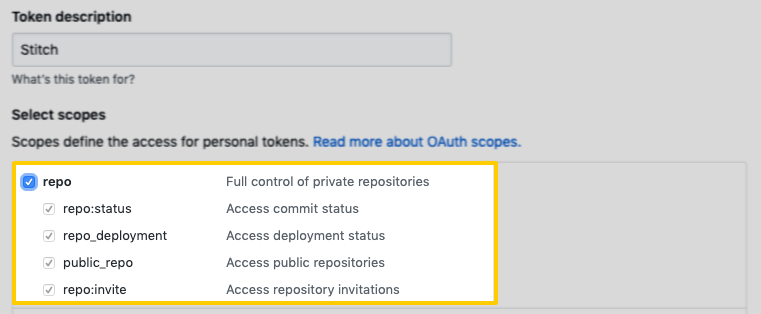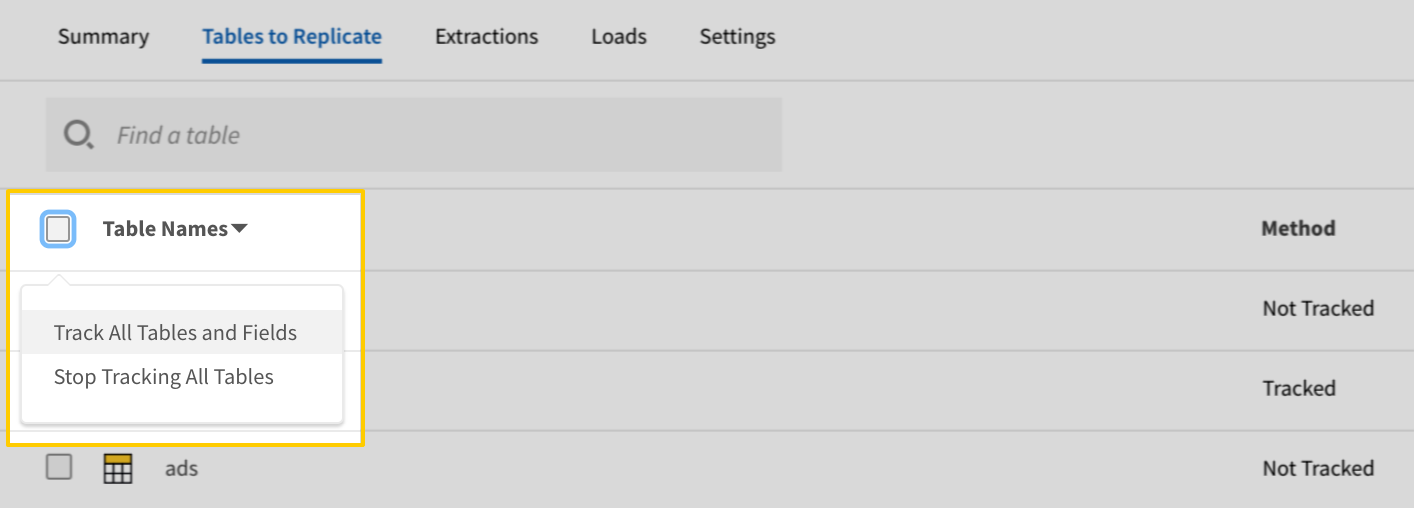LookML is currently in beta. The info in this guide is subject to change.
This integration is powered by Singer's LookML tap. For support, visit the GitHub repo or join the Singer Slack.
LookML integration summary
Stitch’s LookML integration connects to GitHub repositories where your Looker LookML is hosted for your Looker project. Stitch then replicates it using GitHub v3 API to extract LookML components using lkml parser.
Refer to the Schema section for a list of objects available for replication.
LookML feature snapshot
A high-level look at Stitch's LookML (v1) integration, including release status, useful links, and the features supported in Stitch.
| STITCH | |||
| Release status |
Beta |
Supported by | |
| Stitch plan |
Standard |
API availability |
Available |
| Singer GitHub repository | |||
| REPLICATION SETTINGS | |||
| Anchor Scheduling |
Supported |
Advanced Scheduling |
Supported |
| Table-level reset |
Unsupported |
Configurable Replication Methods |
Unsupported |
| DATA SELECTION | |||
| Table selection |
Supported |
Column selection |
Supported |
| Select all |
Supported |
||
| TRANSPARENCY | |||
| Extraction Logs |
Supported |
Loading Reports |
Supported |
Connecting LookML
LookML setup requirements
To set up LookML in Stitch, you need:
-
Access to the GitHub repositories you want to replicate data from. Stitch will only be able to access the same repositories as the user who creates the access token.
Step 1: Create access token
- Sign into your GitHub account.
- Click the User menu (your icon) > Settings.
- Click Developer settings in the navigation on the left side of the page.
- Click Personal access tokens.
- On the Personal access tokens page, click the Generate a personal access token button. If prompted, enter your password.
- In the Description field, enter
stitch. This will allow you to easily idenfiy what application is using the token. -
In the Select Scopes section, check the repo option:

Note: While these are full permissions, Stitch will only ever read your data. The repo scope is required due to how GitHub structures permissions.
- Click the Generate token button.
- The new access token will display on the next page. Copy the token before navigating away from the page - GitHub won’t display it again.
Step 2: Add LookML as a Stitch data source
- Sign into your Stitch account.
-
On the Stitch Dashboard page, click the Add Integration button.
-
Click the LookML icon.
-
Enter a name for the integration. This is the name that will display on the Stitch Dashboard for the integration; it’ll also be used to create the schema in your destination.
For example, the name “Stitch LookML” would create a schema called
stitch_lookmlin the destination. Note: Schema names cannot be changed after you save the integration. - In the API Token field, paste the access token you copied from step 1.
-
In the Git Owner field, enter the owner of the repositories you want to replicate. You can find this info in the repository’s URL. For example: The Git owner of
https://github.com/stitch/stitch-repowould bestitch.Note: While you can replicate data from multiple repositories, this integration only supports replicating from one owner at a time.
-
In the Git Repositories field, enter the repository or repositories you want to replicate. You can find this info in the repository’s URL. For example: The repository of
https://github.com/stitch/stitch-repowould bestitch-repo.To track multiple repositories, enter them as a comma-delimited list. For example:
repo-1, repo-2.
Step 3: Define the historical replication start date
The Sync Historical Data setting defines the starting date for your LookML integration. This means that data equal to or newer than this date will be replicated to your data warehouse.
Change this setting if you want to replicate data beyond LookML’s default setting of 1 year. For a detailed look at historical replication jobs, check out the Syncing Historical SaaS Data guide.
Step 4: Create a replication schedule
In the Replication Frequency section, you’ll create the integration’s replication schedule. An integration’s replication schedule determines how often Stitch runs a replication job, and the time that job begins.
LookML integrations support the following replication scheduling methods:
-
Advanced Scheduling using Cron (Advanced or Premium plans only)
To keep your row usage low, consider setting the integration to replicate less frequently. See the Understanding and Reducing Your Row Usage guide for tips on reducing your usage.
Step 5: Set objects to replicate
The last step is to select the tables and columns you want to replicate. Learn about the available tables for this integration.
Note: If a replication job is currently in progress, new selections won’t be used until the next job starts.
For LookML integrations, you can select:
-
Individual tables and columns
-
All tables and columns
Click the tabs to view instructions for each selection method.
- In the integration’s Tables to Replicate tab, locate a table you want to replicate.
-
To track a table, click the checkbox next to the table’s name. A blue checkmark means the table is set to replicate.
-
To track a column, click the checkbox next to the column’s name. A blue checkmark means the column is set to replicate.
- Repeat this process for all the tables and columns you want to replicate.
- When finished, click the Finalize Your Selections button at the bottom of the screen to save your selections.
- Click into the integration from the Stitch Dashboard page.
-
Click the Tables to Replicate tab.
- In the list of tables, click the box next to the Table Names column.
-
In the menu that displays, click Track all Tables and Fields:

- Click the Finalize Your Selections button at the bottom of the page to save your data selections.
Initial and historical replication jobs
After you finish setting up LookML, its Sync Status may show as Pending on either the Stitch Dashboard or in the Integration Details page.
For a new integration, a Pending status indicates that Stitch is in the process of scheduling the initial replication job for the integration. This may take some time to complete.
Initial replication jobs with Anchor Scheduling
If using Anchor Scheduling, an initial replication job may not kick off immediately. This depends on the selected Replication Frequency and Anchor Time. Refer to the Anchor Scheduling documentation for more information.
Free historical data loads
The first seven days of replication, beginning when data is first replicated, are free. Rows replicated from the new integration during this time won’t count towards your quota. Stitch offers this as a way of testing new integrations, measuring usage, and ensuring historical data volumes don’t quickly consume your quota.
LookML table reference
Schemas and versioning
Schemas and naming conventions can change from version to version, so we recommend verifying your integration’s version before continuing.
The schema and info displayed below is for version 1 of this integration.
This is the latest version of the LookML integration.
Table and column names in your destination
Depending on your destination, table and column names may not appear as they are outlined below.
For example: Object names are lowercased in Redshift (CusTomERs > customers), while case is maintained in PostgreSQL destinations (CusTomERs > CusTomERs). Refer to the Loading Guide for your destination for more info.
model_files
The model_files table contains information about model files in your GitHub about using the Git API Search filename and extension filters for model and lkml.
|
Key-based Incremental |
|
|
Primary Keys |
git_owner git_repository path |
|
Replication Key |
last_modified |
| Useful links |
|
content STRING |
|
download_url STRING |
|
encoding STRING |
|
git_owner
STRING |
|
git_repository
STRING |
|
git_url STRING |
|
html_url STRING |
|
last_modified
DATE-TIME |
|
name STRING |
|
path
STRING |
|
sha STRING |
|
size INTEGER |
|
type STRING |
|
url STRING |
models
The models table contains information about the model file parse items in your GitHub account using the lkml filter.
|
Full Table |
|
|
Primary Keys |
git_owner git_repository path |
| Useful links |
|
access_grants ARRAY
|
||||||||||||||||||||||||||||||||||||||||||||||||
|
case_sensitive STRING |
||||||||||||||||||||||||||||||||||||||||||||||||
|
connection STRING |
||||||||||||||||||||||||||||||||||||||||||||||||
|
datagroups ARRAY
|
||||||||||||||||||||||||||||||||||||||||||||||||
|
explores ARRAY
|
||||||||||||||||||||||||||||||||||||||||||||||||
|
fiscal_month_offset STRING |
||||||||||||||||||||||||||||||||||||||||||||||||
|
git_owner
STRING |
||||||||||||||||||||||||||||||||||||||||||||||||
|
git_repository
STRING |
||||||||||||||||||||||||||||||||||||||||||||||||
|
includes ARRAY |
||||||||||||||||||||||||||||||||||||||||||||||||
|
label STRING |
||||||||||||||||||||||||||||||||||||||||||||||||
|
last_modified DATE-TIME |
||||||||||||||||||||||||||||||||||||||||||||||||
|
map_layers ARRAY
|
||||||||||||||||||||||||||||||||||||||||||||||||
|
named_value_formats ARRAY
|
||||||||||||||||||||||||||||||||||||||||||||||||
|
path
STRING |
||||||||||||||||||||||||||||||||||||||||||||||||
|
persist_for STRING |
||||||||||||||||||||||||||||||||||||||||||||||||
|
persist_with STRING |
||||||||||||||||||||||||||||||||||||||||||||||||
|
sha STRING |
||||||||||||||||||||||||||||||||||||||||||||||||
|
week_start_day STRING |
view_files
The view_files table contains information about view files, using the Git API Search filename and extension filters for views and lkml.
|
Key-based Incremental |
|
|
Primary Keys |
git_owner git_repository path |
|
Replication Key |
last_modified |
| Useful links |
|
content STRING |
|
download_url STRING |
|
encoding STRING |
|
git_owner
STRING |
|
git_repository
STRING |
|
git_url STRING |
|
html_url STRING |
|
last_modified
DATE-TIME |
|
name STRING |
|
path
STRING |
|
sha STRING |
|
size INTEGER |
|
type STRING |
|
url STRING |
views
The views table contains information about the view file parse items in your GitHub account using the lkml filter.
|
Full Table |
|
|
Primary Keys |
git_owner git_repository path |
|
Replication Key |
last_modified |
| Useful links |
|
derived_table OBJECT
|
|||||||||||||||||||||||||||||||||||||||||||||||||||||||||||||||||||||
|
dimension_groups ARRAY
|
|||||||||||||||||||||||||||||||||||||||||||||||||||||||||||||||||||||
|
dimensions ARRAY
|
|||||||||||||||||||||||||||||||||||||||||||||||||||||||||||||||||||||
|
extends ARRAY |
|||||||||||||||||||||||||||||||||||||||||||||||||||||||||||||||||||||
|
extension STRING |
|||||||||||||||||||||||||||||||||||||||||||||||||||||||||||||||||||||
|
filters ARRAY
|
|||||||||||||||||||||||||||||||||||||||||||||||||||||||||||||||||||||
|
git_owner
STRING |
|||||||||||||||||||||||||||||||||||||||||||||||||||||||||||||||||||||
|
git_repository
STRING |
|||||||||||||||||||||||||||||||||||||||||||||||||||||||||||||||||||||
|
last_modified
DATE-TIME |
|||||||||||||||||||||||||||||||||||||||||||||||||||||||||||||||||||||
|
measures ARRAY
|
|||||||||||||||||||||||||||||||||||||||||||||||||||||||||||||||||||||
|
name STRING |
|||||||||||||||||||||||||||||||||||||||||||||||||||||||||||||||||||||
|
parameters ARRAY
|
|||||||||||||||||||||||||||||||||||||||||||||||||||||||||||||||||||||
|
path
STRING |
|||||||||||||||||||||||||||||||||||||||||||||||||||||||||||||||||||||
|
required_access_grants ARRAY |
|||||||||||||||||||||||||||||||||||||||||||||||||||||||||||||||||||||
|
sets ARRAY
|
|||||||||||||||||||||||||||||||||||||||||||||||||||||||||||||||||||||
|
sha STRING |
|||||||||||||||||||||||||||||||||||||||||||||||||||||||||||||||||||||
|
sql_table_name STRING |
|||||||||||||||||||||||||||||||||||||||||||||||||||||||||||||||||||||
|
suggestions STRING |
|||||||||||||||||||||||||||||||||||||||||||||||||||||||||||||||||||||
|
view_label STRING |
| Related | Troubleshooting |
Questions? Feedback?
Did this article help? If you have questions or feedback, feel free to submit a pull request with your suggestions, open an issue on GitHub, or reach out to us.